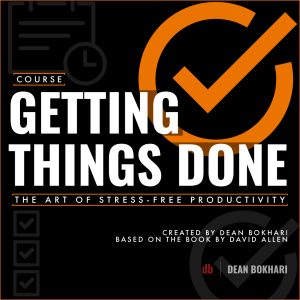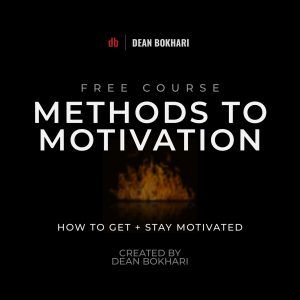Last year, on my 30th birthday, I published a piece on the 30 Life Lessons I Learned in 30 Years. Both the article and podcast versions of that piece became incredibly popular. The audio version has racked up over 125,000 downloads, and the article version has been read by over a million people. This tells me a couple things: (1) Folks want practical life lessons and tips to improve their lives; and (2) people love big ass listicles about personal development.
Side note: If you haven’t already read or listened to the original 30 Life Lessons piece, I’d recommend starting there, because it connects nicely with this follow-up.
That said, as I approach my 31st birthday (November 25th), I’ve decided to publish 30 more life lessons learned in 30 years. I hope it empowers, entertains, and educates you in some way. Enjoy.
1. Fear is a CAUTION sign—not a STOP sign.
Fear is built into our DNA. And for good reason: if we didn’t experience fear, we’d be more susceptible to injury or death… And/or idiotic behavior that could lead to either of the two. If our bodies never produced fight or flight feelings like fear and anxiety, the human species wouldn’t have made it very far. But these days, for sapiens like you and me — fear usually isn’t a life or death issue like it used to be. We no longer have the same fears as our ancestors (who regularly used fear as a signal to run away from lions and other such predators). These days we fear safer stuff, like public-speaking, or making a major career change. These “modern fears” shouldn’t be treated as STOP signs — they’re not lions, they’re just situations. Instead, they should be treated as CAUTION signs — approach them strategically, like a cat who scans a couch prior to leaping on top of it.
2. Don’t prevent yourself from doing something you’re not qualified to do.
I know way too many people—smart, intelligent people—that regularly retreat from acting on their ambitions because they don’t believe they’re qualified to do so. In other words: you don’t need to go back to college and get an MBA to start that business you’ve been dreaming about. Here in the U.S., our country is filled immigrants who barely know their way around the English language, but have started massively successful enterprises regardless of that limitation.
3. Implement buffers.
However long you think something’s going to take you, it’s going to take at least twice as long. Psychologists call this the Planning Fallacy, which means we suck at measuring how long it’ll take us to: accomplish a given task, drive to a certain location, or meet a deadline. This happens to me all the time. The solution to this problem is to implement buffers around the things that fall prey to the Planning Fallacy. For example: I tend to think I can sit down and crank out a 3,000-word article in just 3 hours because I did it once. But this doesn’t account for all those times it took me closer to 6–9 hours to crank out an equally lengthy article. So, instead of giving myself just 3 hours to finish, which causes bouts of anxiety and aggression more often than it causes bouts of creative genius, I’ll implement a simple buffer by multiplying my initial estimates–of how long it’ll take to write the article–by 2X or 3X. One more example before we move on to the next life lesson? Instead of constantly running late to things because you think “it’ll only take 5 minutes to get there,” give yourself a 10-minute buffer to account for traffic. Not only will it make you more punctual, it’ll probably save you from growing few gray hairs.
4. Accept yourself.
I have an ego. I’ll probably always have an ego. You probably have one too. My wife even has a note on our bathroom mirror that says “learn to work with Dean’s ego.” I don’t mind that she has this note up, in fact, I’m the one that thought of the idea to put it up in the first place (there’s my ego again). This is because I know my ego is part of my life, and all I can do is accept that fact and manage it, rather than try to suppress it until it eats me alive. Funny thing is, accepting my ego actually helps me drop my ego.
5. Love yourself.
I’ve learned that it’s impossible to love anyone else unless we first learn to love ourselves. Love yourself like your life depends upon it… Because it does.
6. Be yourself.
If you can ACCEPT yourself and LOVE yourself, then you can BE yourself. Here’s the formula: Self-Acceptance + Self-Love = Being Yourself.
7. Work hard.
There’s an old Chinese proverb that says, “He who sweats more in training, bleeds less in war.“ This means that we must put in the work before we can reap the reward. Most people want the opposite — they want the benefits of having worked hard without lifting a finger… But that’s not how life works, is it? Success requires investment. Work hard on yourself. Work hard on your business or career. And invest as much in your family as you do in your work.
8. Achieving “balance” has nothing to do with time.
I don’t count how many hours a week I work, but I spend WAY more time working than I do with my family. And for the most part, I believe I’m in balance. But how? I spend every Saturday with my 2-year old, Nora. The whole day. We play outside, we go swimming, we make green juice and go grocery shopping. We have fun. And I’m as present as possible. Sure, I think about business for a small percentage of our 10-hour day together, but more than 90% of that day is dedicated to giving Nora the presence she deserves from me, her dad. If I measured this purely based on time, I’d be totally out of balance… But because I measure my sense of life-balance based on presence, I am in balance. You can’t balance life like you’d balance a budget… Achieving balance is about presence, not time.
9. Be the connector.
Become the guy/gal that links people together. If I’m talking with a buddy of mine, and he tells me he’s trying to start a juice bar, and I just happen to know a guy who sells quality organic wholesale vegetables cheaper than anyone else in the state, I’ll go ahead and whip out my phone and ask both friends for permission to connect them with one another. Once I’ve linked them up, I just let them do their thing. I don’t expect a finder’s fee for connecting them. If they help each other, wonderful. If they don’t, no problem. Aside from it plainly being a great thing to do, becoming known as the connector can lead to bigger, unforeseen benefits and opportunities down the road.
10. Be dedicated to mastery.
Be obsessed with something. When you’re no longer obsessed with that, move on to something else. Eventually, you’ll find your main obsession — the thing you want to spend most of your time obsessing about. Then you can dedicate yourself to gaining mastery over that obsession — becoming world-class at it.
11. How you do anything is how you do everything.
When you make your bed, make it with excellence. When you brush your teeth, brush them with excellence. Do everything with excellence. Not because it matters how perfect your bed looks, but because excellence is a habit. And if you do the little stuff well, it’ll be easier to do the big stuff well.
12. Don’t waste your 20s trying to “figure it all out.”
Here’s something you’ll never hear come out of a highly successful person’s mouth: “Oh, you’re so young, you’ve got plenty of time to figure it all out…” NO. Anytime you slip into that mode of thinking – that you can basically piss your 20s away and figure things out in your 30s – just slap yourself in the fucking face and remind yourself that you’re going to die one day. Your 30s aren’t the time to “figure it all out.” Now is the time to figure it out. And the longer you wait, the less time you have.
13. Be antifragile.
This is an idea that comes from what I can say was easily the best book I read this year: Antifragile by Nassim Nicholas Taleb (see FlashBooks summary here). In a nutshell: If you’re a fragile person and something bad happens, you break and stay broken. If you’re resilient and something bad happens, you figure out a way to bounce back. If you’re antifragile and something bad happens, you don’t just bounce back—you become even better than before. Be antifragile.
14. Stay sharp.
How do you chop wood with a blunted axe? You can’t. How do you discuss current events without being current? You can’t. How do you learn something new if you refuse to question your current beliefs? You can’t. How do you constantly continue advancing your career if you don’t constantly continue learning and taking actions that demonstrate your value? You can’t. We don’t become, or remain, successful without staying ahead of the curve, without staying sharp. Always be learning new things about how to move the ball forward. Always execute against what you learn in order to determine whether it works or not. What you know to be successful today may not be successful tomorrow.
15. Take control.
Control is not a bad thing, it’s absolutely beautiful… Think about it: If someone breaks into your house, wouldn’t you want to control the situation (or call the police to help get the intruder under control) to keep yourself and your family safe? Wouldn’t you want to beef up your home security to keep your house safe and under control? More examples: Wouldn’t you prefer to control your time rather than merely manage your time? Don’t you want to be in control of: your finances? your business? your career? your goals? and your health? Control equals power. And I’m not saying you should try to control things that are impossible to control—there are certain things we can’t control, like Donald Trump’s rampant racism and bigotry. But we can control our actions and responses to such behavior—by voting, protesting, and speaking out against this orange baboon to ensure people like him don’t get elected to office ever again. The key is to control what’s within your realm of control, and let go of what isn’t.
16. Always carry a paper notebook.
One habit that’s quite literally helped me transform my life is the habit of always carrying a paper notebook. There’s something about paper that fosters a higher level of creativity. When I write things down on paper, I literally feel like I’m manifesting that thing I’m writing down into existence. What do I write in my notebooks? I write down my goals. I write down plans and lists. I flesh-out ideas. I doodle and draw diagrams and sketches to better understand concepts. You wanna change your life for the better? Buy yourself the nicest notebook you can afford and write something in it everyday. Having a nice notebook, at least for me, helps make it more enjoyable to hold and carry and write in. I don’t mind spending thirty dollars—even a hundred dollars or more—for a notebook that holds million dollar ideas. But it really doesn’t need to be expensive to be useful. Just get yourself a notebook and start using it on a daily basis. You can use it as a planner, a journal, or just a place to capture your thoughts and ideas.
17. No one ever really grows up.
When I was a kid, I’d look at adults and think, “gee, once I grow up, I’ll have everything figured out just like they do.” But then I grew up. And you know what I realized? No one’s got anything figured out. No one actually ever grows up. People just pretend to grow up. They pretend to know what they’re doing. They pretend to have it all figured out. But they’re just as lost as you and me. The life lesson is this: Don’t worry about “growing up” and figuring it all out, because no one ever truly does. Instead, maintain your child-like playfulness and curiosity throughout your entire life… You’ll learn a lot more and enjoy yourself a lot more because of it.
18. Nothing happens without other people.
When I was in high school, I went to a Lil Wayne concert with a bunch of my buddies. There’s only one thing I remember from that concert and it is this: when Wayne hit the stage, the first thing he did was grab a microphone to say: “I wanna say Thank You to everybody out here tonight because without ya’ll, I ain’t shit.” Then he literally repeated “without ya’ll, I ain’t shit” at the top of his lungs at least 20 or 30 more times before starting his show. Now, I understand Weezy is no role model, but he understands a very important thing about life that you absolutely need to know if you want to achieve success at any level—nothing happens without other people. Absolutely nothing. Lil Wayne knows he’d be nowhere if people didn’t buy his music and come to his concerts; which is why he expresses how grateful he is to his fans with so much intensity. Nothing happens without people. And no one succeeds alone. People buy your goods and services. People teach you about your craft. People help you thrive and succeed. A person who tries to lead a life without learning how to: deal with, communicate with, learn from, and love other people will never ever be happy.
19. Take responsibility over everything that happens in your life.
Embracing this life lesson was a major paradigm shift for me. I used to be a whiney little bitch, blaming everyone but myself for my circumstances. I gave up on complaining and making excuses for myself after I realized how little they’ve done for me. “I can’t do blah blah blah because blah blah blah.” It wasn’t until I learned to take responsibility over my own life—my own choices and behaviors—that things began changing for me. Of course, taking responsibility over everything that happens in life isn’t always easy… In fact, it can be pretty hard. But just like any other skill worth developing, it takes hard work and practice to become a person who takes responsibility. But it’s absolutely worth it. Here’s why: it’s incredibly liberating… When things go wrong, I no longer look for people to blame; I look for what I can do to make things right. Taking responsibility is not about always taking blame, it’s about always taking initiative. Stop complaining. Stop making excuses. Take responsibility.
20. Immediate execution.
When you get a new idea, do you do something with it, or do you let it sit? One of the most important life lessons I’ve learned is to take immediate action the very moment I get an idea or learn something new. If I don’t strike while the emotional iron is hot, then my brain starts to come up with excuses to procrastinate and wait on the idea, which usually means I won’t do anything with it at all. Don’t succumb to this because you’ll only regret it. The very moment you receive a new insight or idea, do something with it. If it’s important to you, then you need to attach some small action to it to get the ball moving immediately, or else it’ll never get moving at all.
21. Travel more.
A couple years ago, I went to Genevé, Switzerland with my wife to visit my father-in-law. While walking around the shoppes in downtown Genevé, we decide to find a cafe and have some espressos. We find a nice little place. We walk in, order, and sit down. Then Amna asks me to grab her another piece of chocolate from the front (everyone has chocolate with their coffee out there, it’s awesome). No problem, I walk up to the barista and say “hey buddy, can I grab a few more pieces of chocolate?” He’s absolutely appalled. So appalled, in fact, that he doesn’t even acknowledge me. Why? Because I called him “buddy.” Though that’s friendly language in the US, it’s disrespectful in Switzerland. Interesting right? This is just one of million different nuances you pickup when you travel to different cultures. Every year, we visit at least three countries (usually more.) So far this year (2017), we’ve been to Italy, Greece, Canada, and at least one other place I can’t recall at the moment. Point is: traveling is one of the most enriching things you can do. It gives you an understanding of how other people live, behave, and interact. It exposes you to new and interesting cultures.
22. Find your WHY.
Your WHY is the purpose, cause, or belief that drives you to take consistent action, both personally and professionally. My WHY is “to empower, entertain and educate people everywhere to achieve their goals and improve their lives.” What’s yours? If you don’t know it, read this.
23. PQ, IQ, EQ, SQ.
Do at least one thing every day that helps you grow:
- physically (PQ),
- mentally (IQ),
- emotionally (EQ),
- spiritually (SQ.)
24. Sometimes systems are better than goals.
We all need goals. But sometimes it’s just more helpful to setup systems rather than goals. For example: “Lose 20 pounds” is a goal. “Eating right” is a system. In this scenario, “Lose 20 pounds” is an unhelpful goal that makes you feel like a failure until you either: a) achieve the goal, or b) drop the goal. Either way, you’re left feeling like a loser. If your goals make you feel inferior–if they make you feel disempowered–then it might be time to adopt a system.
25. Action leads to motivation (not the other way around.)
Here’s how most people approach motivation: MOTIVATION—>ACTION—>MORE MOTIVATION. Here’s how motivation really works: ACTION—>MOTIVATION—>MORE MOTIVATION. Regardless of what you want to get motivated about, the answer always begins with action. Action is the impetus for motivation. Action is the precursor to motivation. Action comes first, motivation comes after.
26. There’s no such thing as healthy competition.
Competition breeds jealousy, hatred, and desperation. I know it’s hard to get away from it in our rank-based society–I feel my competitive juices bubbling up just like anyone else. But this doesn’t change the truth: competition is destructive. The only time competition is a good thing is when we’re competing against ourselves.
27. Polarity = power.
No one succeeds by pleasing everyone. You should be loved by many, and hated by many… Neutrality doesn’t move mountains, inspire change, or ignite passion. Hold strong opinions and beliefs about the things that matter most to you in life.
28. Be open to new ideas.
I know I just told you that polarity is power, but that doesn’t mean you shouldn’t be open to the possibility that what you know now could be wrong. Defend your beliefs, but keep an open mind.
29. Most people want to be led, so take the lead.
Next time you’re in a situation where people are looking at each other, looking around the room for someone to speak up and say something… Go ahead and take that as an opportunity to stand up and say something! Stand up and take the lead. You’re a leader the moment you decide to be.
30. Your past does not dictate your future.
So many people hold themselves back with false beliefs about themselves because of what has happened in their past. But the past is the past. My rule about the past is simple: if I can’t use it, I lose it. If it’s a good memory that I can reflect on, I keep it. If it’s a past experience that taught me something, I keep it. If I cannot use my past to help me become a better version of myself in the future, I delete it from my memory. And I’d suggest you do the same if you truly desire to milk as much meaning and magic and joy out of your life.
Audio / Podcast Version
The audio/podcast version of this piece is broken into two episodes:
- EP195. 30 More Life Lessons Learned in 30 Years (Lessons 1—15)
- EP196. 30 More Life Lessons Learned in 30 Years (Lessons 16—30)
If you haven’t listened to the original 30 Life Lessons Learned in 30 Years episode from last year yet, I’ve included it below—you’ll probably find it most enjoyable approaching it like a 3-part podcast series.
Click the Play button(s) below to start streaming now. Or use the icons at the bottom of each audio player to select your preferred method of listening (iTunes, MP3 download, etc.)
Part 1: EP170. 30 Life Lessons Learned in 30 Years
Part II: EP195. 30 More Life Lessons Learned in 30 Years (Lessons 1—15)
Part III: EP196. 30 More Life Lessons Learned in 30 Years (Lessons 16—30)
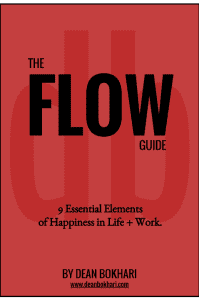
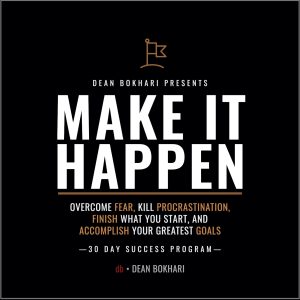
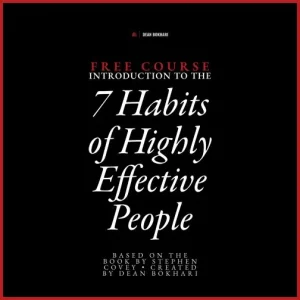 Free Course: Intro to The 7 Habits of Highly Effective People by Stephen Covey • Instructed by Dean Bokhari.
Free Course: Intro to The 7 Habits of Highly Effective People by Stephen Covey • Instructed by Dean Bokhari.